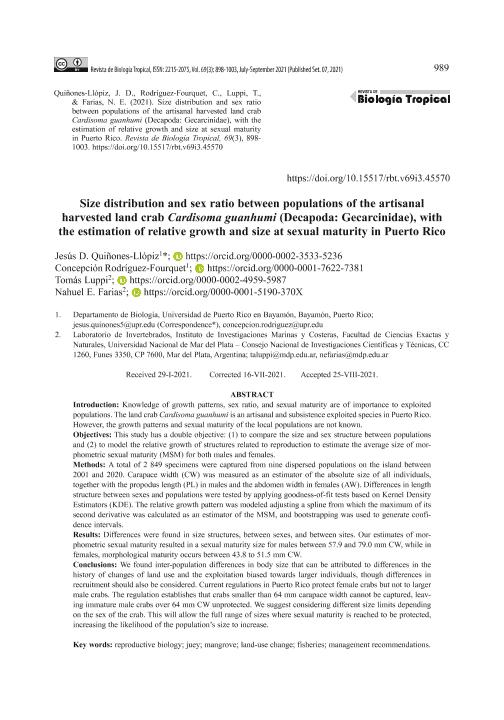Mostrar el registro sencillo del ítem
dc.contributor.author
Quiñones Llópiz, Jesús David

dc.contributor.author
Rodríguez Fourquet, Concepción
dc.contributor.author
Luppi, Tomas Atilio

dc.contributor.author
Farias, Nahuel Emiliano

dc.date.available
2023-11-06T12:20:11Z
dc.date.issued
2021-09
dc.identifier.citation
Quiñones Llópiz, Jesús David; Rodríguez Fourquet, Concepción; Luppi, Tomas Atilio; Farias, Nahuel Emiliano; Size distribution and sex ratio between populations of the artisanal harvested land crab Cardisoma guanhumi (Decapoda: Gecarcinidae), with the estimation of relative growth and size at sexual maturity in Puerto Rico; Revista de Biología Tropical; Revista de Biología Tropical; 69; 3; 9-2021; 989-1003
dc.identifier.issn
0034-7744
dc.identifier.uri
http://hdl.handle.net/11336/217070
dc.description.abstract
Introduction: Knowledge of growth patterns, sex ratio, and sexual maturity are of importance to exploited populations. The land crab Cardisoma guanhumi is an artisanal and subsistence exploited species in Puerto Rico. However, the growth patterns and sexual maturity of the local populations are not known. Objectives: This study has a double objective: (1) to compare the size and sex structure between populations and (2) to model the relative growth of structures related to reproduction to estimate the average size of morphometric sexual maturity (MSM) for both males and females. Methods: A total of 2 849 specimens were captured from nine dispersed populations on the island between 2001 and 2020. Carapace width (CW) was measured as an estimator of the absolute size of all individuals, together with the propodus length (PL) in males and the abdomen width in females (AW). Differences in length structure between sexes and populations were tested by applying goodness-of-fit tests based on Kernel Density Estimators (KDE). The relative growth pattern was modeled adjusting a spline from which the maximum of its second derivative was calculated as an estimator of the MSM, and bootstrapping was used to generate confi-dence intervals. Results: Differences were found in size structures, between sexes, and between sites. Our estimates of morphometric sexual maturity resulted in a sexual maturity size for males between 57.9 and 79.0 mm CW, while in females, morphological maturity occurs between 43.8 to 51.5 mm CW. Conclusions: We found inter-population differences in body size that can be attributed to differences in the history of changes of land use and the exploitation biased towards larger individuals, though differences in recruitment should also be considered. Current regulations in Puerto Rico protect female crabs but not to larger male crabs. The regulation establishes that crabs smaller than 64 mm carapace width cannot be captured, leav-ing immature male crabs over 64 mm CW unprotected. We suggest considering different size limits depending on the sex of the crab. This will allow the full range of sizes where sexual maturity is reached to be protected, increasing the likelihood of the population’s size to increase.
dc.format
application/pdf
dc.language.iso
eng
dc.publisher
Revista de Biología Tropical

dc.rights
info:eu-repo/semantics/openAccess
dc.rights.uri
https://creativecommons.org/licenses/by/2.5/ar/
dc.subject
FISHERIES
dc.subject
JUEY
dc.subject
LAND-USE CHANGE
dc.subject
MANAGEMENT RECOMMENDATIONS
dc.subject
MANGROVE
dc.subject
REPRODUCTIVE BIOLOGY
dc.subject.classification
Biología Marina, Limnología

dc.subject.classification
Ciencias Biológicas

dc.subject.classification
CIENCIAS NATURALES Y EXACTAS

dc.title
Size distribution and sex ratio between populations of the artisanal harvested land crab Cardisoma guanhumi (Decapoda: Gecarcinidae), with the estimation of relative growth and size at sexual maturity in Puerto Rico
dc.type
info:eu-repo/semantics/article
dc.type
info:ar-repo/semantics/artículo
dc.type
info:eu-repo/semantics/publishedVersion
dc.date.updated
2023-11-06T09:50:24Z
dc.journal.volume
69
dc.journal.number
3
dc.journal.pagination
989-1003
dc.journal.pais
Costa Rica

dc.journal.ciudad
Turrialba
dc.description.fil
Fil: Quiñones Llópiz, Jesús David. Universidad de Puerto Rico; Puerto Rico
dc.description.fil
Fil: Rodríguez Fourquet, Concepción. Universidad de Puerto Rico; Puerto Rico
dc.description.fil
Fil: Luppi, Tomas Atilio. Consejo Nacional de Investigaciones Científicas y Técnicas. Centro Científico Tecnológico Conicet - Mar del Plata. Instituto de Investigaciones Marinas y Costeras. Universidad Nacional de Mar del Plata. Facultad de Ciencias Exactas y Naturales. Instituto de Investigaciones Marinas y Costeras; Argentina
dc.description.fil
Fil: Farias, Nahuel Emiliano. Consejo Nacional de Investigaciones Científicas y Técnicas. Centro Científico Tecnológico Conicet - Mar del Plata. Instituto de Investigaciones Marinas y Costeras. Universidad Nacional de Mar del Plata. Facultad de Ciencias Exactas y Naturales. Instituto de Investigaciones Marinas y Costeras; Argentina
dc.journal.title
Revista de Biología Tropical

dc.relation.alternativeid
info:eu-repo/semantics/altIdentifier/doi/http://dx.doi.org/10.15517/rbt.v69i3.45570
Archivos asociados
